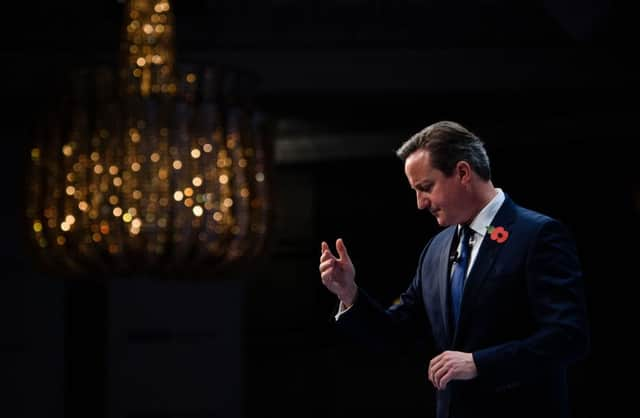David Cameron sets out EU negotiation objectives


In a speech in central London, David Cameron will insist that other EU members must accept that the UK is exempt from the aim of “ever closer union” while the role of national parliaments is bolstered, end the “abuse” of free movement, protect the rights of non-Eurozone countries in the single market and “write competitiveness into the DNA of the EU”.
The speech comes as the Prime Minister sends his letter to European Council President Donald Tusk with the key demands and objectives as he hopes to enter the final stages of his renegotiation which will form the basis of the In/ Out referendum to be held by the end of 2017.
Advertisement
Hide AdAdvertisement
Hide AdThe letter follows Mr Cameron confirming yesterday, while addressing businessmen, that he still wants a ban on EU citizens drawing benefits in the UK for four years, an issue that it is understood has the backing of German Chancellor Angela Merkel.
However, the letter has been accompanied by a threat from Mr Cameron to other governments in the EU that he is prepared to consider leading the exit campaign if his requests are rejected by other member states.
Mr Cameron will use the speech today to also tackle criticism from eurosceptics in his own party who have attacked him for not being clear with his demands and not going far enough in wanting to reform the EU.
Already, senior Tory backbenchers, including former frontbenchers Bernard Jenkin and Owen Paterson, have started to set up the main exit campaign, which includes organisations such as Business for Britain.
Ukip are also running a campaign, headed by its leader Nigel Farage, who has claimed the Prime Minister “cannot be trusted” on Europe.
But Mr Cameron will highlight his own record of managing to cut the EU Budget, get Britain out of the eurozone bailout system and veto plans for a new treaty which would have taken more powers to Brussels.
On his objectives in the negotiation, he will say: “These are the four objectives at the heart of our renegotiation. Objective One: protect the single market for Britain and others outside the Eurozone. What I mean by that is a set of binding principles that guarantee fairness between Euro and non-Euro countries.”
On Objective Two, to write competitiveness into the DNA of the whole EU, he will say: “This includes cutting the total burden on business.”
Advertisement
Hide AdAdvertisement
Hide AdHe will underline the importance of Objective Three, to exempt Britain from an “ever-closer union” and bolster national parliaments.
He will warn that this must “not be through warm words but through legally binding and irreversible changes”.
Finally, on Objective Four, to tackle abuses of the right to free movement, he will say it is vital to “enable us to control migration from the European Union, in line with my manifesto.”
On his resolve to reform the EU, with the aim of recommending that we stay in, he will say: “I have set out today the changes I want to see, and which Britain needs to see. There will be those who say – here and elsewhere in the EU – that we are embarked on Mission Impossible. I say: why? I do not deny that seeking changes which require the agreement of 27 other democracies, all with their own concerns, is a big task.
“But an impossible one? I do not believe so for a minute.”
He will add: “When you look at the challenges facing European leaders today, the changes that Britain is seeking do not fall in the box marked ‘impossible’.
“They are eminently resolvable, with the requisite political will and political imagination.
“The European Union has a record of solving intractable problems. It can solve this one. Let us therefore resolve to do so.”
The SNP have warned that if the UK votes to leave the EU but a majority of Scottish voters want to stay it will be a reason for a second independence referendum.